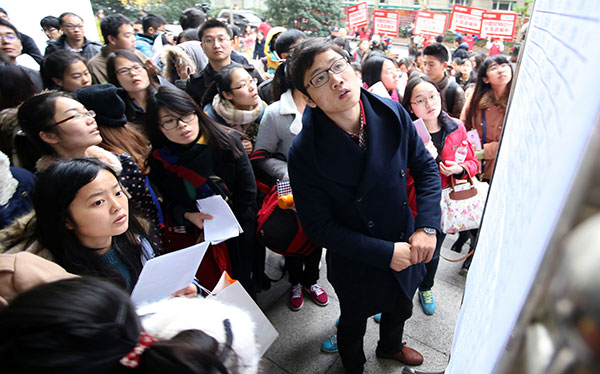
Candidates for the 2015 national civil service exam search for their seats at Nanjing Forestry University in Jiangsu province on Nov 30.(XU YIJIA/CHINA DAILY)
Less-developed areas attract little interest as benefits, opportunities lag behind big cities
Applicants for China's national public servants' exam, or guokao, are showing unprecedented interest in certain jobs, but paying little attention to others, according to the State Administration of Civil Service.
The test, along with job preferences, is required for people applying for the more than 27,000 government posts available. The test application period closes on Monday.
A vacancy at the Central Committee of the China Democratic League's reception office attracted a record-breaking 6,233 applications, but more than 400 other bureaus, mostly in poor regions, had received no applications by Saturday, according to the administration.
A total of 849,328 people passed the first round of screening, meaning that an average of more than 31 candidates will compete for each vacancy, roughly the same number as last year.
The State Administration of Taxation's nationwide branches seemed to be the most highly desired employer, with its offices in Guangdong, Shandong and Sichuan provinces all attracting more than 29,000 candidates each.
Last year, 2,274 people competed for a vacancy at the China Employment Training Technical Instruction Center, while in 2011 and 2013, most people vied for a position at the State Ethnic Affairs Commission. These jobs tend to have a lower threshold for first-round selection and are located in big cities.
Zhu Lijia, a professor of public administration at the Chinese Academy of Governance, said the polarization of applicants' choices has existed for the past seven or eight years.
"When people make choices, they tend to go with the principle of economics. They want their gains maximized," Zhu said. "It is natural for them to choose jobs with better benefits, more opportunities for development and good locations."
Less-developed areas continue to struggle to attract workers. For example, Hohhot Railway Public Security Bureau in the Inner Mongolia autonomous region is looking to hire 12 new workers, but by Saturday had not received a single application. The State Administration of Civil Service even issued a public announcement online to draw people's attention to the neglected vacancies.
Zhu expects the pattern to continue, despite the central government's attempts to drive more talent to rural and poor areas.
"It matters little what the government says," Zhu said. "If the pay and benefits are not significantly improved in poor regions, little will change."
Last year, only one out of 33 participants managed to secure a government post, while the enrollment rate for the national college entrance examination, or gaokao, has surpassed 70 percent every year since 2011, according to public records.
Government posts have long been perceived by Chinese as secure lifelong jobs, with stable pay and good benefits. Hence applicants for such vacancies have been soaring since 1994, when the national selection for government employees was first made public.
However, some potential applicants have said that the central government's anti-graft campaign launched in 2013 to fight corruption and extravagance, including the "eight-point rules" to cut bureaucracy, has put them off.


















































